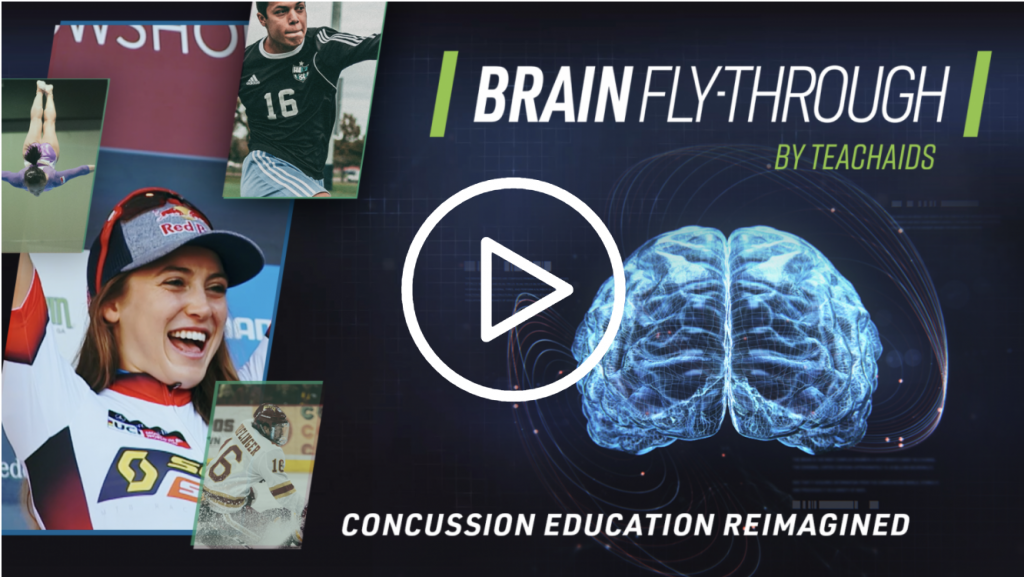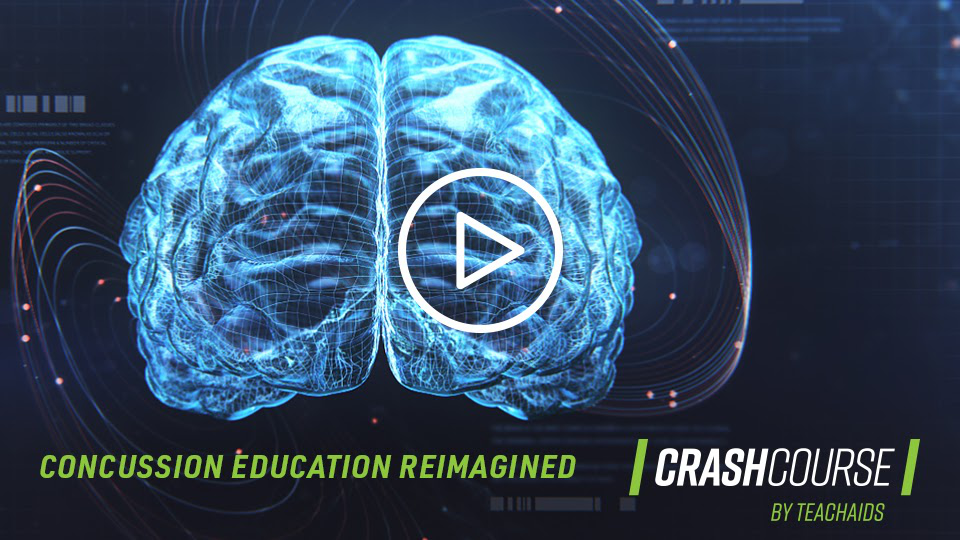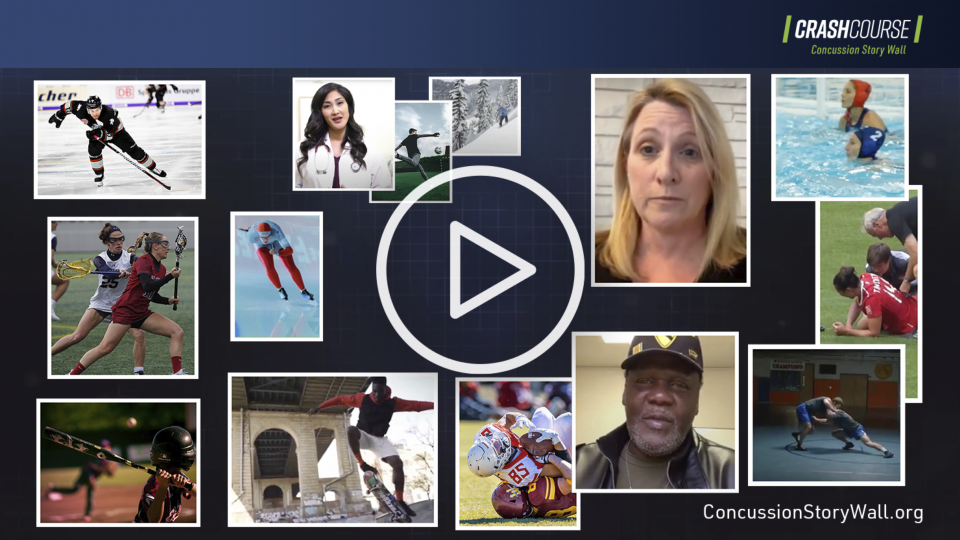Our Approach to Concussion Education
The TeachAids CrashCourse product suite educates people on the prevention and treatment of concussions.
Step 1
Identify the problem
We work with our stakeholders to identify global health challenges to determine if they can be addressed through targeted health education solutions.
According to available research, more than 2 million people sustain a concussion in the United States each year; current data sources, however, may only capture 1 of every 9 injuries. While public awareness of concussions has improved in recent years, understanding of the injury and its effects is not widespread. Medically referred to as mild traumatic brain injuries, concussions can cause long-lasting cognitive, emotional, and physical issues when not treated properly. This all-too-common injury is surrounded by myths and misconceptions, which were especially apparent to us when we engaged with the youth sports community.

Three out of five high school athletes don’t report their concussions. Given the public’s poor understanding of concussion symptoms, young people are often unaware that they have a concussion or are afraid to speak up when they suspect they may be injured. Like many challenging health topics, concussions have also become stigmatized as many athletes opt to “shake it off” and play through the symptoms, not fully understanding the consequences of doing so. In recent years, research has revealed that sports-related concussions are twice as likely in females as in males. Female athletes also report a higher number of symptoms and increased injury severity after concussion than males. With better prevention, education, and evolving treatment protocols, we can support all students in navigating social, structural, and political pressures so they can safely return to their regular activities.
Step 2
Embrace complexity
We seek to understand the socioeconomic, medical, and cultural influences impacting the problem.
We aimed to understand the reasons why youth were not reporting concussions and the role education could play to shift this perspective. Our approach began with conducting thousands of hours of interviews across myriad stakeholders, including coaches, parents, teachers, medical professionals and students. In order to fully comprehend the culture around sports injuries, our reach was broad and deep – ranging from interviews with local high school athletes to Team USA Olympians. Over the years of developing this work, we’ve engaged thousands of community participants to understand the deep cultural conflicts and empathize with those affected.

We discovered that proper identification and treatment of concussions was impeded by several challenges. First, although there were ample materials available for adults, there was a dearth of customized, research-based, and compelling education for the students themselves. This was especially problematic because decisions to report concussions are often ultimately in the hands of the injured athletes and their teammates. This extends beyond sports to all those affected by concussion.
Second, rapidly evolving science meant that existing materials were often incorrect or outdated. Medical experts shared countless stories of parents administering treatment plans based on misconceptions. For instance, many parents believed that concussions could only occur from direct hits to the head, that they were more serious if there was a loss of consciousness, and that individuals with concussions should be confined in a dark room. This is in direct contrast to current research, which shows that moderate exercise (as indicated by a physician) is important for those healing from a concussion.
Third, the increasing prevalence of concussions among youth was coupled with an abundance of media attention on the issue. However, the time-constraints of news reporting made it difficult for concerned individuals to obtain a full understanding of the issue. People often came away with, and made decisions based on, fragmented knowledge.
Step 3
Innovate solutions
We identify solutions that will resonate and thrive in complex and diverse communities.
Over the past few years, we have collaborated with hundreds of academics, researchers, and physicians – nationwide and beyond – to understand how best to design and develop the most impactful concussion education. We then turned our attention to the target audience: young people. We worked with thousands of youth spanning middle school through college and conducted sessions formally via several classes offered through Stanford University’s Graduate School of Education, Department of Pediatrics, and School of Medicine. Through numerous human-centered design activities and hundreds of iterations on storyboards, youth and college-aged students offered valuable insights to guide leading experts to build the most engaging, interactive curricula possible:
CRASHCOURSE PRODUCT SUITE
1. CRASHCOURSE: CONCUSSION EDUCATION (12 MIN)
- Synthesizes first-person and third-person experiential perspectives to inform and motivate learning about concussion signs and symptoms
- Corrects myths and misconceptions and helps the viewer recognize the seriousness of reporting
- Recognizes the importance of working with a medical professional to determine the best strategy for improvement
- Available online as a standard video and in virtual reality (Oculus Rift/Rift S | Oculus Go)
- Course Completion Certification available for athletes, parents and coaches (see FAQ page)
2. CRASHCOURSE: BRAIN FLY-THROUGH (8 MIN)
- Uses state-of-the art technology from Stanford University’s Neurosurgical Simulation and Virtual Reality Center
- Prefaced by dramatic race footage, a world mountain biking champion takes the viewer on a journey through the human brain
- Conceptualizes an otherwise “invisible” injury
- Showcases the brain’s blood vessels, nervous system, and cerebrospinal fluid cavities
- Emphasizes the complexity and fragility of the brain
- Available online as a standard video and in virtual reality (Oculus Rift/Rift S | Oculus Go), accompanied by a Teacher’s Guide
3. CRASHCOURSE: CONCUSSION STORY WALL
- An interactive database featuring 4,000 stories from individuals describing their personal concussion experiences
- A comprehensive mental health resource for everyone including students, parents, coaches, teachers, and military veterans
- Includes videos from leading medical experts describing symptoms and best practices for recovery
- Serves as a referral source for athletic trainers, rehab specialists, and physicians
The Concussion Story Wall gave voice to the many individuals affected by concussions, both inside and outside the sports community. We felt it necessary to create a product illustrating the diversity of individuals with concussions – their backgrounds, their symptoms, and their stories. While sports-related concussions often receive the most media attention, concussions happen in many situations like falls, motor vehicle accidents, and through incidents of domestic violence. We used videos from real people with concussions along with videos from medical experts to give users a well-rounded understanding of concussion.
We have made our education available to all at no cost. Visit our CrashCourse product page to learn more.
To ensure the creation of medically accurate, unbiased, and trusted materials, TeachAids only accepts funding from entities with no conflicting interests.
INSTITUTE FOR BRAIN RESEARCH AND INNOVATION
With the vision of producing the most effective and compelling concussion education, TeachAids established the Institute for Brain Research and Innovation in 2021. Using qualitative and quantitative research methods, the vision of the Institute is to understand how best to promote knowledge relating to concussion symptoms, their severity, and the importance of timely reporting. The goal of this research is to help develop education-based interventions and evaluate their efficacy to promote positive outcomes.
The Director of this Institute is Daniel Daneshvar, M.D., Ph.D., faculty at Harvard Medical School and Chief of Brain Injury Rehabilitation at Mass General Brigham. He is a world-renowned researcher on the long-term effects of moderate-severe traumatic brain injury, concussion, and repetitive head impacts, including chronic traumatic encephalopathy (CTE).
The Institute studies the landscape of concussion education. Below are peer-reviewed publications, with several others in the pipeline.
Daneshvar DH, Yutsis M, Baugh CM, Pea RD, Goldman S, Grant GA, Ghajar J, Sanders LM, Chen C, Tenekedjieva LT, Gurrapu S, Zafonte RD, Sorcar P. Evaluating the effect of concussion education programs on intent to report concussion in high school football. Journal of athletic training. 2021 Jan 6.
Daneshvar DH, Baugh CM, Yutsis M, Pea RD, Goldman S, Grant GA, Cantu RC, Sanders LM, Chen CL, Lama RD, Zafonte RD, Sorcar P. Athlete enjoyment of prior education moderates change in concussion-reporting intention after interactive education. INQUIRY: The Journal of Health Care Organization, Provision, and Financing. 2021 May;58:00469580211022641.
Daneshvar DH, Baugh CM, Lama RD, Yutsis M, Pea RD, Goldman S, Grant GA, Cantu RC, Sanders LM, Zafonte RD, Hainline B, Sorcar P. Participating in two video concussion education programs sequentially improves concussion-reporting intention. Neurotrauma reports. 2021 Dec 1;2(1):581-91.
Step 4
Engage stakeholders
We secure strategic partnerships with prominent global and community partners.
With sports being at the intersection of many complementary disciplines, we built a coalition to engage the most powerful influencers across the world. From policy makers, medical institutions, foundations, and media outlets to schools and sports organizations, we used our collective voices to provide comprehensive education to those who need it most, for free. Our partnerships with the U.S. Olympic and Paralympic Committee’s National Governing Bodies, Stanford’s Lucile Packard Children’s Hospital, and the National Council of Youth Sports allowed us to educate over 60 million youth in organized sports programs.
Our collaborations with the Brain Injury Association of America, National Association of State Head Injury Administrators, VA Palo Alto Health Care System, Stanford Program on International and Cross-Cultural Education (SPICE), and other special programs helped us broaden our reach beyond the sports community.
Step 5
Distribute products
Our mission is to provide access to our lifesaving health education to as many people as possible.
The CrashCourse product suite has been shared by organizations throughout the United States, Canada, and Great Britain to educate diverse populations. Below is a list of such organizations (in alphabetical order):
- Alberta Female Hockey League (Canada)
- Alpha Youth Sports
- American Youth Football & Cheer (AYF)
- Arkansas (commenced by their governor, CrashCourse has been instituted throughout the state)
- Brain Injury Association of America
- British Taekwondo
- California Therapy Solutions
- EAST Initiative (Education Accelerated by Service and Technology)
- Etrainu
- Garnes Enterprises
- George Brown College (Canada)
- HeadCheck Health (Canada)
- Headway Foundation
- HitCheck
- i9 Sports
- The LEMO Foundation
- Lucile Packard Children’s Hospital
- National Association of State Head Injury Administrators (NASHIA)
- National Interscholastic Cycling Association
- National Council of Youth Sports
- Neurovine
- North Carolina (CrashCourse is mandatory for all athletes and parents in the state)
- Oculus VR
- One Hit Away Foundation
- Pacific Junior Hockey League (Canada)
- Palo Alto Veteran’s Association
- Pop Warner Little Scholars
- Positive Coaching Alliance
- Red Deer College (Alberta, Canada)
- Royal Military College (Canada)
- Sacred Heart Preparatory
- SportsEd TV
- Sports Engine
- Stanford Neurosurgical Simulation & Virtual Reality Center
- Stanford Program on International and Cross-Cultural Education (distributed to their list of more than 10,000 educators representing all major school districts in the U.S.)
- SyncThink
- TeamSnap
- The LEMO Foundation
- University of British Columbia (Canada)
- Washington Student Cycling League
- US Olympic and Paralympic Committee (released CrashCourse content via their nationwide coaching newsletter to 400,000 coaches representing more that 50 sports). Note: Several of the USOPC’s National Sports Governing Bodies provide formal “certifications” upon successful completion of the CrashCourse curriculum through their own platforms. Learn more by visiting our FAQ page.
All our products are under a Creative Commons License and available at no cost.


